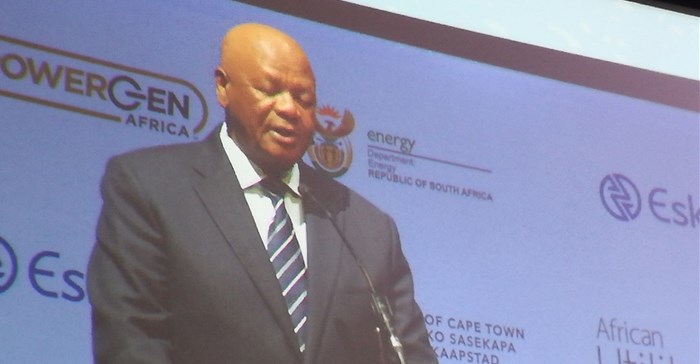
While he reiterated the country’s commitment to safe and clean energy, he stated that the region’s abundant and cheap coal reserves could not simply be abandoned. “However this is counter-balanced by the high carbon content that coal has, and this cost was internalised when we analysed policy options where emissions reduction targets and carbon taxes are introduced,” he said at the opening of the African Utility Week and Powergen Africa in Cape Town.
“While a paradigm shift is required for these emission reduction targets to be realised, as government we cannot do this in a manner that is unjust relative to those that would be negatively affected by these adjustments. Our vast coal deposits cannot be sterilised simply because we cannot explore technological innovations to exploit the coal. The timing of the transition to a low carbon economy, in line with our accession to the Paris Agreement, must be in a manner that is not insensitive to the potential impacts on jobs and local economies,” he pointed out.
Therefore, technologies such as carbon capture and storage, underground coal gasification, coal to liquids and other clean coal innovations will be explored that continue using our coal resources in an environmentally responsible way.
The proposed IRP also enables independent power producers (IPP) to contribute alongside Eskom and municipalities. “I am on record as having indicated that Eskom alone cannot meet our power capacity requirements, because we estimate that the capacity extension under the IRP will cost in excess of R1trn in the period up to 2030, including the new power plants plus the requisite transmission and distribution infrastructure.
“With the increased penetration of renewable energy technologies, particularly wind and solar, the need for gas infrastructure has become critical. Southern Africa we will be able to expand electricity generation through the use of gas given the huge potential and opportunity in this regard. For South Africa, we were excited a few weeks ago when Total announced the Brulpadda resource discovery in the Outeniqua Basin,” Radebe said.
He explained that imported liquefied natural gas (LNG), piped natural gas, imported liquefied petroleum gas (or LPG), indigenous gas like coal-bed methane and ultimately shale also part of South Africa’s strategy for regional economic integration within the Southern African Development Community (Sadc), to provide the energy infrastructure to support economic growth.
“Energy ministers in Sadc have recogniesd the strategic need for a regional Gas Master Plan, given the recent gas discoveries in the region. Mozambique and Tanzania gas resources in particular, are well positioned for cross-boundary development of gas pipeline infrastructure. It is important that gas demand in the region is serviced from regional gas resources, so as to increase the opportunity for intra-African trade and economic collaboration. The planned gas pipeline from Rovuma Basin in Mozambique through South Africa and possibly beyond, fits into this strategy.
“Interconnection with our neighbouring countries also gives us an opportunity not only to improve our energy mix by harnessing the hydro-potential in these countries, but it also bodes well for economic collaboration in Sadc as a whole. As you might be aware, South Africa is leading discussions with our regional neighbours on hydroelectricity, notably from the Democratic Republic of the Congo (DRC) in terms of the Treaty on the Grand Inga Hydropower Project.
"Sub-Saharan Africa is home to several of the world’s fastest growing economies, including the Top 10. As Sadc, we want to emulate the examples of Ethiopia, Rwanda, Ghana, Kenya, Senegal amongst others, and the resolution of SADC electricity challenges will prod even faster development in our region,” he concluded.
